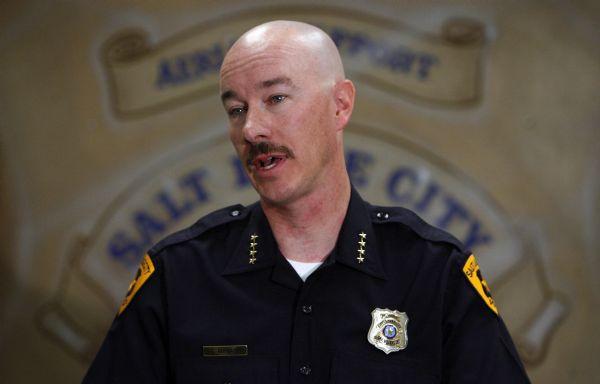This is an archived article that was published on sltrib.com in 2009, and information in the article may be outdated. It is provided only for personal research purposes and may not be reprinted.
As you begin the experience of the U.S. Holocaust Museum in Washington, D.C., one of the first images you encounter is a photo of a Nazi soldier standing with a German police officer. Conspicuously, the identical theme exists at Yad VaShem, Israel's memorial to Holocaust victims.
The Nazi propaganda and hatred effort did not begin with imprisonment and genocide. It was instituted subtly, declaring the criminality of those deemed inferior. Laws were developed and regulations restricting movement, mandating identification and limiting human rights were also passed. Co-opting the trusted local constabulary was instrumental in enforcement of those laws.
Unfortunately, throughout history local law enforcement has been an extremely effective arm of oppression. How many individuals in the United States were lynched, under the color of authority, for violations of Jim Crow laws?
The essential duty of modern law enforcement is to protect the civil rights of individuals while providing for the safety of all members of the communities we serve, equally, without bias. Asking local police agencies to enforce federal immigration laws, as Utah's new law does, is contrary to our mission, marginalizes significant segments of the population, and complicates and ultimately harms effective community policing. We function best when we are part of, not apart from, the community.
Police officers should not engage in civil immigration enforcement. However, local law enforcement should diligently continue to arrest serious criminal offenders and, as appropriate, refer dangerous criminals to federal authorities. Civil immigration enforcement is a federal responsibility, and it is paramount to the well-being of our neighborhoods that the federal government maintains accountability.
This is the central finding of a report from the Police Foundation, a research organization in Washington, D.C. focusing on law enforcement issues. Noting that police agencies throughout the country were increasingly being asked to assume immigration enforcement responsibilities, the foundation conducted a yearlong study to determine the appropriate balance between immigration enforcement, civil liberties and community safety.
I had the honor of participating in the national conference with more than 100 law enforcement peers and executives. While the debate was enthusiastic, several recurring themes emerged. The costs of participating in the U.S. Immigration and Customs Enforcement's 287(g) program outweigh the benefits. Additionally, local police officers should be prohibited from arresting and detaining persons to investigate immigration status absent probable cause of an independent state criminal law violation.
After speaking with law enforcement officers and community leaders throughout the country, the Police Foundation concluded that local immigration enforcement damages the relationship between local police and communities; in fact, individuals are less likely to report crimes or participate as witnesses due to fear of immigration enforcement.
It is pointedly ironic that the state of Utah, founded by Mormon pioneers who immigrated to the region seeking religious freedom and escape from local governmental persecution, has chosen to assume a negative and biased position toward immigrants and all individuals different from the majority.
We have already observed a chilling effect upon victims and witnesses as well as a polarization within neighborhoods regarding immigration legislation (Senate Bill 81) that went into effect on Wednesday. Often unrecognized in the debate is the significant adverse impact upon all individuals of color. How is a police officer to determine status without detaining and questioning anyone who speaks, looks or acts as if they might be from another nation?
For many years, Washington has failed to repair a broken immigration system, and local police officers have been irresponsibly designated to pick up the slack. By increasing our role in civil immigration action, state and local officers are placed in the untenable position of potentially engaging in unconstitutional racial profiling while attempting to maintain trust within the communities we protect.
Today, as we celebrate the birth of our nation, it is important to note that the foundation of our Republic is not based on the rule of the majority. Democracy and those elected to serve must guard against the tyranny of the majority or of mob rule and ensure the well-being of the downtrodden or underrepresented.
Requiring police agencies to engage in civil immigration activities diverts critical resources away from our central responsibilities during a time of budget cuts and staffing shortages. The Salt Lake County Jail releases, on average, 900 criminal violators monthly due to overcrowding. Funding issues prohibit utilization of existing bed space and the facility cannot meet current demand. Detainees held for reasons of civil immigration status alone will necessitate the release of an even larger number of criminals into our neighborhoods.
Immigration issues instigate some of the most heated debate in the United States today. Unfortunately, this deliberation has yet to include the voice of law enforcement, whose job and mission are drastically impacted by immigration policy. As the Police Foundation report recommends, the federal government needs to pass comprehensive immigration reforms to truly fix the problem and relieve the burden on state and local police. They also need to involve the perspective of police in this upcoming debate.
Memorials and museums are erected in remembrance of those who died, but additionally, and most importantly, to ensure that we do not repeat the mistakes or misdoings of the past.
Chris Burbank is Salt Lake City's police chief.



